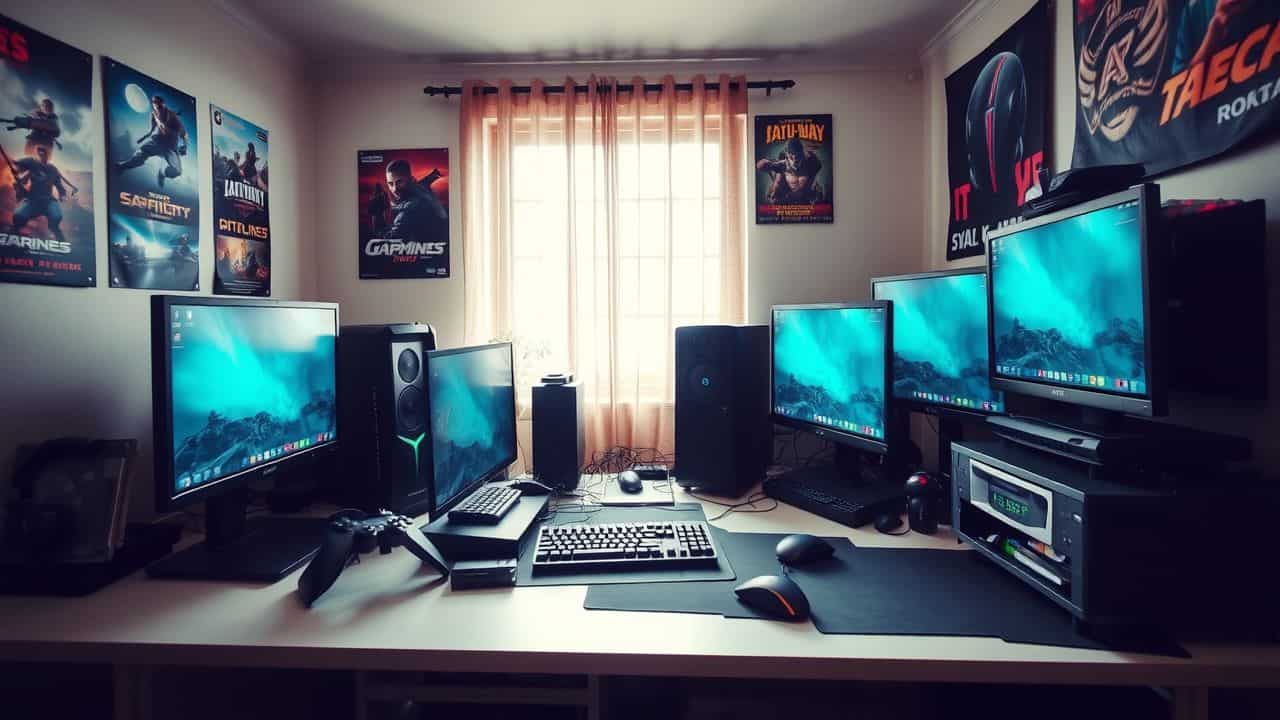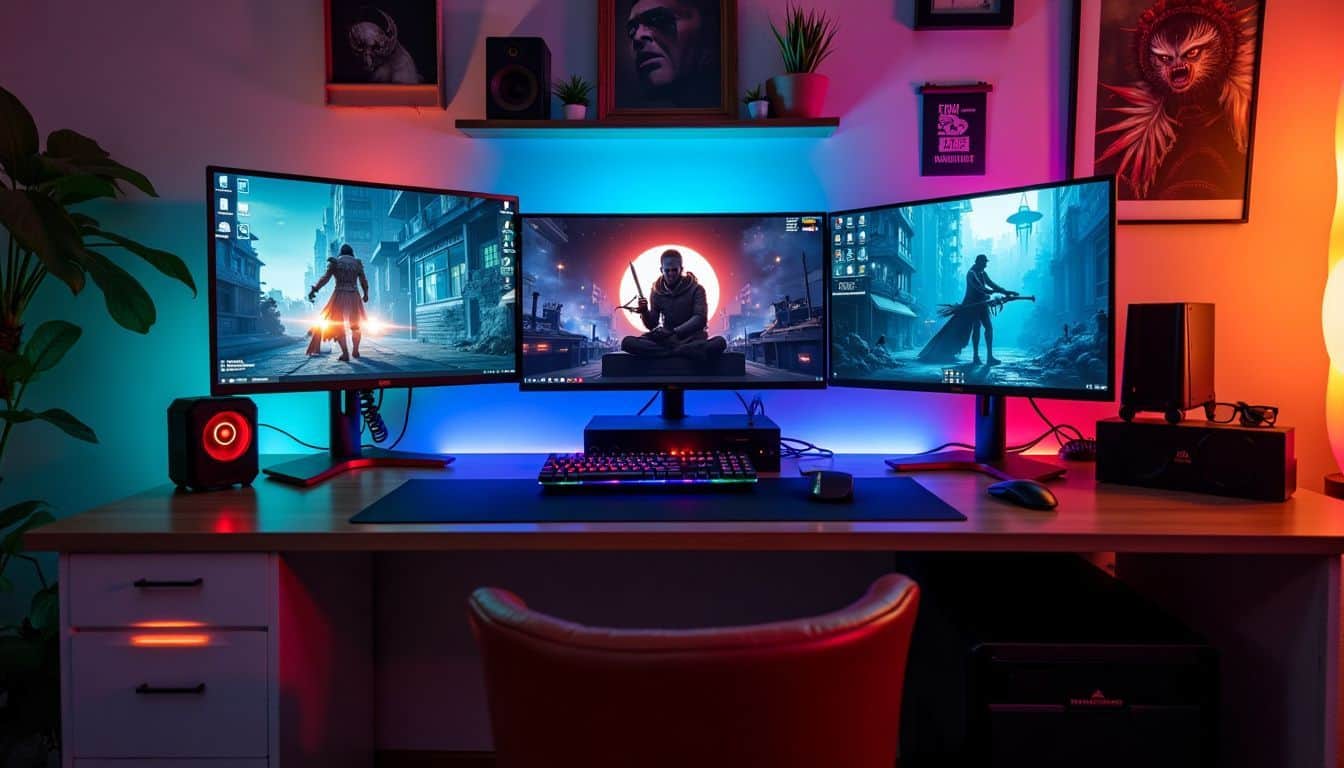Ever wondered how much cash pro gamers rake in? It’s a question that’s got many aspiring players scratching their heads. Here’s a shocker: top-tier gamers can earn over a million bucks a year! 3 This article will break down nine ways gamers can turn their passion into a paycheck.
Ready to level up your income? 1 2
Key Takeaways
Top pro gamers can earn over $1 million per year through streaming, tournaments, sponsorships, and other income sources.
Popular Twitch streamers make $50 to $200,000 monthly from subscriptions, donations, ads, and merchandise sales.
Esports prize pools are huge, with Dota 2 leading at $356 million total, followed by Fortnite at $188 million.
Pro League of Legends players in North America earn an average salary of $410,000, while some Chinese players make up to 45 million RMB yearly.
Gaming expenses are significant, including $1,500-$3,000 for a high-end PC, $2,000-$5,000 yearly for travel, and ongoing costs for gear, subscriptions, and health care.
Table of Contents
The Economics of Professional Gaming

Pro gamers are raking in the dough these days. From Twitch streams to YouTube vids, there’s cash to be made if you’ve got the skills and hustle.
Generating Income on Twitch

Twitch offers gamers a gold mine of income options. Subscriptions are a big one – at $4.99 a month, streamers pocket $3 for each loyal fan. Do the math: 1,000 subs equals $3,000 monthly.
Not too shabby! But that’s just the start. Bits, donations, ads, and merch sales can seriously boost a streamer’s bank account. 1
Small-time streamers might pull in $50 to $1,500 a month, depending on their audience size. But the big fish? They’re swimming in cash. Top-tier streamers can rake in $100,000 to $200,000 monthly.
Take ‘Imaqtpie’ for example – this guy nets around $9,000 a month just from streaming. It’s crazy money, but it takes hard work and a bit of luck to hit those numbers. 2
Streaming isn’t just playing games – it’s a full-time job with a paycheck to match.
Earning through Game Streaming

Game streaming opens up a whole new world of cash for gamers. It’s not just about Twitch anymore. YouTube Gaming, Facebook Gaming, and other platforms let players show off their skills live.
Fans tune in to watch, chat, and even donate money. Top streamers can rake in big bucks from ads, sponsorships, and loyal subscribers. 3
I’ve seen firsthand how game streaming can pay off. My buddy started streaming Dota 2 matches last year. At first, he had just a few viewers. But he kept at it, streaming daily and interacting with fans.
Now he’s got over 10,000 followers and makes enough to game full-time. It’s not millions, but it’s a sweet gig. The key? Be yourself, engage your audience, and stream often. With time and effort, game streaming can turn into a real money-maker. 4
Monetizing Gameplay on YouTube

Like streaming, YouTube offers gamers a way to earn cash. But it’s a bit different. On YouTube, you can upload edited videos of your gameplay. These videos can make money through ads, sponsorships, and fan support. 3
To succeed on YouTube, you need to post often and make great content. Many pro gamers use both Twitch and YouTube. This lets them reach more fans and earn more money. Some even hire editors to help make their videos better.
It’s hard work, but it can pay off big time for skilled players who know how to entertain. 4
Revenue Streams from Online Casino Gaming

Online casino gaming offers a goldmine for savvy gamers. Players can rake in cash through various channels. Some folks win big jackpots. Others earn steady income from loyalty programs.
Smart gamers also profit from affiliate marketing. They get a cut when they bring new players to the casino. Plus, skilled players can join VIP clubs for extra perks and bonuses.
But here’s the kicker – online gaming has shaken up traditional casinos. It’s taken a bite out of their profits. For every dollar earned online, brick-and-mortar casinos lose about 30 cents. 5 That’s a big deal in the gambling world. The impact is heightened by the growing popularity of crypto casinos. Many gamers find the best Bitcoin casinos more appealing as they offer more, newer games, the option to gamble with higher stakes, and near-instant access to any winnings made. Of course, gambling isn’t a guaranteed way to make money, but following a strategy and making the most of online casinos’ generous bonuses can give you a head-start over those who don’t.
Maximizing Profits with Sponsorships

Sponsorships can be a gold mine for pro gamers. Big brands love to team up with popular players. Want to know how to score these sweet deals? Keep reading!
Partnership Opportunities for Players

Gamers can score big with sweet partnership deals. Top brands are lining up to team up with pro players, opening doors to cash and fame. 6
- Red Bull and Monster Energy: These drink giants love gamers. They offer cash, free products, and cool swag. 4
- Gaming gear companies: Razer, Logitech, and SteelSeries pay pros to use their stuff. Players get free gear and a paycheck.
- Clothing brands: Nike and Adidas are jumping into esports. They make special gaming shoes and jerseys.
- Tech firms: Intel and AMD want gamers to show off their chips. They give players the latest hardware and pay them to talk it up.
- Fast food chains: KFC and Taco Bell see gamers as their target crowd. They offer meal deals and fun promos with players.
- Car makers: BMW and Mercedes-Benz are revving up their gamer partnerships. Pro players get to drive fancy cars and star in ads.
- Streaming platforms: Twitch and YouTube Gaming pay top streamers to stay on their sites. This can mean big bucks for popular players.
- Game developers: Companies like Riot Games hire pros to test new games. Players get early access and a say in game design.
- Non-gaming brands: Even banks and phone companies want in on gaming. They offer special deals and use players in their marketing.
Collaborations with Tech Companies

Tech companies often team up with pro gamers. These partnerships can be a gold mine for skilled players. 7
- Intel and AMD sponsor top esports teams. They give players cutting-edge gear to use in tournaments.
- Razer works with streamers to show off their mice and keyboards. Gamers get free stuff and cash for using Razer products on stream.
- Twitch partners with popular streamers. They offer better revenue splits and more features to keep talent on their platform.
- Red Bull sponsors individual gamers and whole teams. They pay players to drink Red Bull on camera and wear branded gear.
- HyperX provides headsets to pro teams. Players test new models and give feedback to improve designs.
- Nvidia teams up with streamers to show off their graphics cards. Gamers get early access to new tech and cash for demoing it.
- Discord works with top servers to test new features. Admins get perks and inside info on upcoming changes. 6
- Gaming chair companies like DXRacer sponsor pros. Players get comfy seats and money to sit in them on stream.
Competitive Gaming and Prize Money

Ever wondered how much cash pro gamers rake in from tournaments? Spoiler alert: it’s jaw-dropping. Stick around to learn more about the prize pools that’ll make your head spin!
How Prize Money is Shared Among Players
Prize money sharing in esports isn’t as simple as you’d think. It’s not just about winning and getting a big check. There’s a whole system behind it.
| Aspect | Details |
|---|---|
| Team vs Individual | – Team games: Prize split among players, coaches, org – Solo games: Winner takes all, minus org cut |
| Org Cut | – Usually 10-50% of winnings – Covers player salaries, training costs 3 |
| Player Share | – Varies by game and team – Often not equal – star players get more |
| Taxes | – Players pay taxes on winnings – Rate depends on country and amount won |
| Sponsorship Impact | – Some sponsors take a cut of winnings – Others offer bonuses for wins/placements 4 |
It’s a complex system. Players don’t just pocket all the cash they win. But for top performers, the payoff can be huge. Just ask the Dota 2 champs who’ve walked away with millions. It’s not all glory though – travel costs and gear expenses can eat into profits if you’re not careful.
Top Earning Games in Esports
Shifting gears from how prize money splits among players, let’s dive into the big fish of the esports pond. You got it, we’re talking about the games lining players’ pockets with those sweet, sweet dollars. Believe it or not, some games are like the golden geese of the esports world. Let’s break it down, shall we?
Here’s a nifty table showing you the top earners. Remember, gaming isn’t just fun and games; for some, it’s serious cash.
| Rank | Game | Total Prize Money |
|---|---|---|
| 1 | Dota 2 | $356,748,522.22 |
| 2 | Fortnite | $188,502,195.29 |
| 3 | Counter-Strike: Global Offensive | $162,403,024.06 |
| 4 | League of Legends | $113,024,462.28 |
So, Dota 2 sits at the top like the king of the hill, with a whopping $356 million plus in prize money. Imagine that! Gamers competing in Dota 2 tournaments are swimming in a deep pool of cash. Fortnite, not too far behind, makes a strong case for second place. Its battle royale format has clearly won hearts and wallets, amassing over $188 million in prizes. 8
Now, don’t underestimate the third placer, Counter-Strike: Global Offensive (CS:GO). It’s a classic that refuses to bow out, maintaining its stronghold with over $162 million. Lastly, League of Legends, while fourth, still presents impressive figures, crossing the $113 million mark.
Interested in joining the ranks of esports competitors? This might be your chance to not just play but also win big. For more on how to get started, check out this link on how to join an esports team.
Remember, it’s not just about being good at games. It’s about strategy, dedication, and yeah, a little bit of luck. Who knows? Maybe we’ll see your name on the leaderboards someday. Keep gaming, and keep dreaming! 6
Standard Salaries for Esports Professionals
Pro gamers’ paychecks can make your jaw drop! Some League of Legends stars rake in six figures yearly. But wait… there’s more to this story. Keep reading to see how much these digital athletes really earn.
Pay Scale for League of Legends Experts
League of Legends pros are raking in some serious cash. Let’s break down the numbers.
| League | Average Salary | Notes |
|---|---|---|
| LCS (North America) | $410,000 | As of 2020 |
| LPL (China) | Varies (up to RMB 45 million) | One player hit the jackpot |
| Riot Games Minimum | $12,500 | Annual base pay |
Crazy, right? Top dogs in North America’s LCS pocket a cool $410k on average. But China’s taking it to another level. One LPL player’s scoring RMB 45 million yearly – that’s insane! 3
Even rookies aren’t left high and dry. Riot Games makes sure every pro gets at least $12,500 a year. It’s not much, but it’s a start. 9
Remember, these are just base salaries. The real money comes from sponsorships, streaming, and tournament winnings. Some players are living large while others are just scraping by.
Bottom line? If you’re good enough, League of Legends can be your ticket to the big leagues. Just don’t quit your day job… yet.
Comparative Salaries in Different Games
Different games offer varying paychecks for pro gamers. Let’s break it down:
| Game | Top Players | Average Players | Low-Ranking Players |
|---|---|---|---|
| Dota 2 | $420,000 | $24,000 – $180,000 | $6,000 – $12,000 |
| CS:GO | $480,000 | $180,000 – $240,000 | $60,000 |
| Call of Duty | $363,000 | N/A | $55,225 |
| Fortnite | $77,000 | $46,874 | $27,500 |
CS:GO leads the pack with the highest top-player salary. 10Dota 2 shows the widest range, from $6,000 to $420,000. Call of Duty offers a solid base for low-ranking players. Fortnite, while popular, has lower payouts across the board. 11These numbers can change fast, though. The gaming world is always shifting! Now, let’s look at some financial challenges pro gamers face.
Diverse Income Sources for Gamers

Pro gamers rake in cash from more than just playing. They sell merch, make appearances, and even start their own brands. Want to know how much they can really make? Keep reading!
Revenue from Merchandise Sales
Gamers can rake in cash from selling cool stuff. T-shirts, hoodies, and hats with team logos fly off the shelves. Fans love to show off their favorite players’ gear. It’s like wearing a piece of the game.
Some pros even design their own merch lines. This adds a personal touch that fans eat up.
But merch isn’t the golden ticket to riches. It’s more like extra pocket money for most teams. 12 Still, every bit helps in the gaming world. Smart pros use merch to boost their brand and connect with fans.
It’s a win-win: gamers get paid, and fans get awesome swag. 13
Earnings from Public Appearances
Public appearances can be a gold mine for pro gamers. Top players get paid to show up at events, sign autographs, and chat with fans. It’s like being a rock star but for the gaming world.
Some pros rake in thousands of dollars for a single appearance. But it’s not just about the money. These gigs help gamers build their brand and connect with sponsors. It’s a win-win situation – fans get to meet their idols, and gamers pad their wallets.
The cash from these events adds to a gamer’s diverse income streams. Along with streaming, tournaments, and merch sales, appearances round out a pro’s paycheck. It’s hard to pin down exact figures, as each gamer’s draw is different.
But for the big names in gaming, showing up can mean big bucks. It’s just one more way the gaming biz has grown up, offering more ways for pros to make a living doing what they love. 4
Financial Hurdles in the Gaming Profession

Gaming pros face money ups and downs – but there’s more to this story! Want to know how they tackle these cash challenges? Keep reading…
Manage Fluctuating Earnings
Pro gamers face ups and downs in their income. Smart money moves to help them stay afloat during lean times.
- Budget carefully: Track every penny. Set aside cash for slow months. This helps even out the fluctuations in your bank account.
- Vary your income: Spread your earnings across different sources. Mix it up with streaming, sponsorships, and merch sales. More income streams mean more stability. 6
- Save for tough times: Put away 20-30% of your earnings. This safety net can cover you when prize money is scarce.
- Invest smartly: Put some cash into low-risk investments. They can grow your money while you focus on improving your skills.
- Live modestly: Avoid overspending. Keep your living costs low, even when the big bucks roll in.
- Prepare for taxes: Set aside money for the IRS. Unexpected tax bills can damage your finances faster than a boss fight.
- Get insured: Protect yourself with health and disability insurance. One injury could impact your career and your income.
- Seek financial advice: Talk to a pro who understands the gaming world. They can help you make smart money decisions suited to your unique situation.
- Be adaptable: Be ready to change. The gaming industry shifts quickly. Your ability to adjust can keep your earnings steady. 4
Managing money is important for pro gamers. But it’s just one piece of the puzzle. Let’s look at how esports is expanding and creating new opportunities for players.
Expenses for Gaming Gear and Travel
Pro-level gaming isn’t cheap. Let’s break down the costs that can make or break a gamer’s budget.
- High-end gaming rig: $1,500 – $3,000
- Custom-built PC with top-notch CPU and GPU
- Multiple monitors for better gameplay and streaming
- Mechanical keyboard and precision mouse
- Pro-grade headset: $200 – $400
- Crystal-clear audio for team communication
- Noise-canceling tech to block out distractions
- Gaming chair: $300 – $500
- Ergonomic design for long gaming sessions
- Adjustable features for perfect posture
- Streaming setup: $500 – $1,000
- High-quality webcam and microphone
- Green screen and lighting for pro-level streams
- Travel costs for tournaments: $2,000 – $5,000 per year
- Flights to major gaming events worldwide
- Hotel stays during multi-day competitions
- Meals and local transport at event locations 14
- Team jerseys and merch: $100 – $300
- Official team gear for tournaments and fan meets
- Custom-made items for personal branding
- Game subscriptions and in-game purchases: $500 – $1,000 per year
- Access to the latest game versions and DLCsVirtual items to stay competitive in-game 9
- Internet and electricity: $1,200 – $2,000 per year
- High-speed, low-latency internet for smooth gameplay
- Increased power bills from constant gaming and streaming
- Health and wellness: $500 – $1,000 per year
- Eye exams and glasses for screen strain
- Wrist supports and ergonomic accessories
People Also Ask
How do pro gamers make money?
Pro gamers cash in through various channels. They rake in dough from esports tournaments, ad revenue on live streams, and subscription services. Some even score sweet deals with big-name sponsors. It’s not all fun and games, though. The job market for pro gamers is tough as nails.
Can you really make a living playing video games?
You bet! Professional video gamers are turning their passion into paychecks. From YouTube channels to Patreon supporters, the opportunities are growing. But don’t quit your day job just yet. Success in this field is as rare as a unicorn sighting.
What’s the average wage for a professional gamer?
There’s no one-size-fits-all answer here. Wages vary wildly based on skill, popularity, and luck. Top dogs like xQcOw can rake in millions, while others might struggle to cover the cost of living. It’s a rollercoaster ride, for sure.
Are there jobs in gaming besides being a pro player?
Absolutely! The gaming world is chock-full of opportunities. Game testing, live streaming, and creating YouTube videos are just the tip of the iceberg. Some folks even land gigs with big-shot companies like Team Liquid. The sky’s the limit!
Do I need special equipment to start earning as a gamer?
Not necessarily, but it helps. A decent computer, a reliable internet connection, and a good browser like Firefox are must-haves. For streaming, you’ll want a mic and camera. But remember, skills trump gear any day of the week.
Is gaming a viable career for everyone?
Let’s keep it real – not everyone can hit the jackpot in gaming. It takes a mix of talent, hard work, and a sprinkle of luck. Plus, the field isn’t always welcoming to everyone. Native American and Caucasian gamers alike face challenges. But if you’ve got the chops and the drive, why not give it a shot?
References
^ https://streamyard.com/blog/how-much-do-twitch-streamers-make
^ https://brave.com/learn/how-much-money-do-twitch-streamers-earn/ (2023-07-17)
^ https://esportsinsider.com/2023/04/how-do-esports-players-make-money
^ https://www.teknosassociates.com/how-do-professional-gamers-make-money/
^ https://digitalscholarship.unlv.edu/grrj/vol15/iss2/5/
^ https://medium.com/@systementcorp/gaming-as-a-career-how-professional-gamers-are-making-millions-a80873a611dc
^ https://www.ncbi.nlm.nih.gov/pmc/articles/PMC7438909/
^ https://www.esportsearnings.com/games
^ https://weplayholding.com/blog/esports-salary-how-much-do-professional-gamers-earn/ (2021-12-24)
^ https://www.ziprecruiter.com/Salaries/Esports-Salary
^ https://jkcp.com/professional-gamer-salary-esports/
^ https://mercercapital.com/article/esports-business-models-article/
^ https://wearerockwater.com/how-esports-revenue-models-will-drive-the-600b-global-sports-market-pt1/
^ https://readyesports.com/how-much-money-can-i-make-as-a-professional-gamer/
